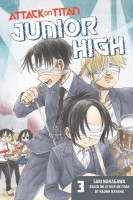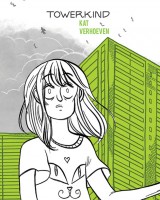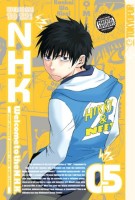My News and Reviews
I was on vacation last week, much of which was spent in the middle of the woods in the middle of Ohio camping with my family. This meant I had very little Internet access. But even so, I did manage to post two reviews last week. My monthly horror manga review project continued with a review of After School Nightmare, Volume 4 by Setona Mizushiro. This was the first volume in the series that I hadn’t previously read before embarking on the review project. The second review was of Satoshi Wagahara’s prize-winning light novel The Devil Is a Part-Timer!, Volume 1 which is very amusing and silly. But, having watched the anime series last year, I already knew that.
As previously mentioned, I was occupied with other things last week, so I probably missed out on all sorts of interesting reading, news, and announcements. However, there were a few things that came across my radar before I left for Ohio. Kathryn Hemmann at Contemporary Japanese Literature wrote about The Cultural Cross Pollination of Shōjo Manga. And speaking of shōjo manga, Digital Manga’s most recent Tezuka Kickstarter is aiming to publish Storm Fairy. (The project also aims to reprint Unico with better image and color quality, which makes me wonder why Digital Manga didn’t do that for the first printing, but I’ve given up trying to understand Digital Manga’s decision making.) Finally, Udon Entertainment announced a new manga license: Shuji Sogabe’s adaptation of Persona 4.
Quick Takes
 Attack on Titan: Junior High, Omnibus 3 (equivalent to Volumes 5-6) by Saki Nakagawa. Out of all the various Attack on Titan spinoffs, Junior High is the one that probably has the smallest audience overall and is the one that is the most uneven for me specifically. Sometimes the manga can be a slog to get through, but sometimes it’s absolutely hilarious. At its best, Junior High can actually make me laugh out loud; I keep reading the series for those moments because when Junior High is funny, it is very funny. The manga continues to be a very weird mix of Attack on Titan and a generic school setting with all of the standard tropes that that entails. Sometimes the combination works better than others. This particular omnibus features the school culture festival, a battle of the bands, eating contests and cooking competitions, club activities, lots of cleaning, and school rivalries among other things. I was very pleased to see that characters and storylines from other Attack on Titan spinoffs like No Regrets are now being incorporated into Junior High as well.
Attack on Titan: Junior High, Omnibus 3 (equivalent to Volumes 5-6) by Saki Nakagawa. Out of all the various Attack on Titan spinoffs, Junior High is the one that probably has the smallest audience overall and is the one that is the most uneven for me specifically. Sometimes the manga can be a slog to get through, but sometimes it’s absolutely hilarious. At its best, Junior High can actually make me laugh out loud; I keep reading the series for those moments because when Junior High is funny, it is very funny. The manga continues to be a very weird mix of Attack on Titan and a generic school setting with all of the standard tropes that that entails. Sometimes the combination works better than others. This particular omnibus features the school culture festival, a battle of the bands, eating contests and cooking competitions, club activities, lots of cleaning, and school rivalries among other things. I was very pleased to see that characters and storylines from other Attack on Titan spinoffs like No Regrets are now being incorporated into Junior High as well.
 Lies Are a Gentleman’s Manners by Marta Matsuo. Since for whatever reason Digital Manga often seems to be hesitant to include “Volume 1” in the title of a new manga, I didn’t initially realize that Lies Are a Gentleman’s Manners is actually an ongoing series in Japan. The first volume stands well enough on its own, but I do hope that any subsequent volumes will be licensed as well. Despite the fact that neither of the leads in this boys’ love manga are particularly likeable—Jonathan, an unscrupulous medical student selling drugs to his fellow classmates, and Paul, his equally unscrupulous (and married) college professor who uses that fact to blackmail him into a relationship—I actually do want to read more. Though some of the situations are unquestionably unsavory, the manga can also be very funny and even sexy on occasion. One of the most interesting things about Lies Are a Gentleman’s Manners is its setting. The manga takes place on America’s modern East Coast among the country’s wealthy, aristocratic upper class. While certainly a fictional representation, some of the social dynamics ring true.
Lies Are a Gentleman’s Manners by Marta Matsuo. Since for whatever reason Digital Manga often seems to be hesitant to include “Volume 1” in the title of a new manga, I didn’t initially realize that Lies Are a Gentleman’s Manners is actually an ongoing series in Japan. The first volume stands well enough on its own, but I do hope that any subsequent volumes will be licensed as well. Despite the fact that neither of the leads in this boys’ love manga are particularly likeable—Jonathan, an unscrupulous medical student selling drugs to his fellow classmates, and Paul, his equally unscrupulous (and married) college professor who uses that fact to blackmail him into a relationship—I actually do want to read more. Though some of the situations are unquestionably unsavory, the manga can also be very funny and even sexy on occasion. One of the most interesting things about Lies Are a Gentleman’s Manners is its setting. The manga takes place on America’s modern East Coast among the country’s wealthy, aristocratic upper class. While certainly a fictional representation, some of the social dynamics ring true.
 Towerkind by Kat Verhoeven. Originally self-published as a series of mini-comics, Towerkind was recently collected and released by Conundrum Press in a single volume. I was not previously familiar with Verhoeven’s work; Towerkind was a TCAF-inspired impulse buy. I’m very glad that I picked it up though because I’m loving this comic to pieces. Towerkind certainly won’t be to everyone’s liking, but there’s just something about the comic that I find oddly compelling. It’s surreal, strange, chilling, and ominous. Verhoeven effectively uses a small format to create a claustrophobic atmosphere that emphasizes the feeling of impending doom experienced by the characters. The volume opens with a foreword by Georgia Webber explaining the importance of the backdrop of Towerkind—Toronto’s first vertical neighborhood of high-rise apartments St. James Town—which helps to set the stage and tone for the comic itself. Towerkind follows a group of children gifted with unexplainable supernatural abilities who live in the towers of St. James Town while what may be the end of the world approaches.
Towerkind by Kat Verhoeven. Originally self-published as a series of mini-comics, Towerkind was recently collected and released by Conundrum Press in a single volume. I was not previously familiar with Verhoeven’s work; Towerkind was a TCAF-inspired impulse buy. I’m very glad that I picked it up though because I’m loving this comic to pieces. Towerkind certainly won’t be to everyone’s liking, but there’s just something about the comic that I find oddly compelling. It’s surreal, strange, chilling, and ominous. Verhoeven effectively uses a small format to create a claustrophobic atmosphere that emphasizes the feeling of impending doom experienced by the characters. The volume opens with a foreword by Georgia Webber explaining the importance of the backdrop of Towerkind—Toronto’s first vertical neighborhood of high-rise apartments St. James Town—which helps to set the stage and tone for the comic itself. Towerkind follows a group of children gifted with unexplainable supernatural abilities who live in the towers of St. James Town while what may be the end of the world approaches.
 Welcome to the N.H.K., Volumes 5-8 by Kendi Oiwa. Having already read the original Welcome to the N.H.K. novel by Tatsuhiko Takimoto and having already seen the Welcome to the N.H.K. anime series (which, it turns out, was based on both the novel and Oiwa’s manga adaptation), I am already quite familiar with the story and characters Welcome to the N.H.K., but I somehow managed to forget just how dark and hard-hitting it can be. Ostensibly Welcome to the N.H.K. is a comedy, and it can be quite funny in a painful sort of way, but it deals with some pretty heavy subject matter including (but not limited to) drug use, self-harm, suicide, and mental illness. The second half of the series, while at times outrageous, tends to fall on the more serious side of things. Although I’ve always considered Welcome to the N.H.K. to be Satou’s story, the manga also places particular emphasis on Misaki’s story. It’s been a while since I’ve read or watched them, but I believe the manga actually has a unique ending that’s different from both the novel and the anime. All three version of Welcome to the N.H.K. are very good.
Welcome to the N.H.K., Volumes 5-8 by Kendi Oiwa. Having already read the original Welcome to the N.H.K. novel by Tatsuhiko Takimoto and having already seen the Welcome to the N.H.K. anime series (which, it turns out, was based on both the novel and Oiwa’s manga adaptation), I am already quite familiar with the story and characters Welcome to the N.H.K., but I somehow managed to forget just how dark and hard-hitting it can be. Ostensibly Welcome to the N.H.K. is a comedy, and it can be quite funny in a painful sort of way, but it deals with some pretty heavy subject matter including (but not limited to) drug use, self-harm, suicide, and mental illness. The second half of the series, while at times outrageous, tends to fall on the more serious side of things. Although I’ve always considered Welcome to the N.H.K. to be Satou’s story, the manga also places particular emphasis on Misaki’s story. It’s been a while since I’ve read or watched them, but I believe the manga actually has a unique ending that’s different from both the novel and the anime. All three version of Welcome to the N.H.K. are very good.
